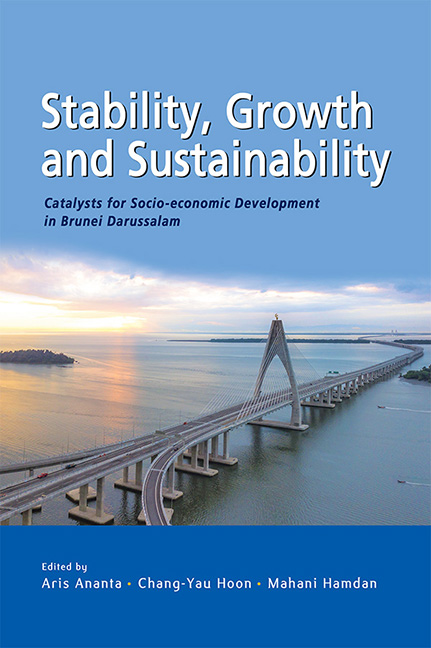12 - Employment and Welfare
Published online by Cambridge University Press: 10 January 2024
Summary
INTRODUCTION
There are three main characteristics of a rentier state. First, oil revenues are paid to governments in the form of rent. Second, oil revenues are externally generated from exports. Third, oil revenues are directly accumulated by the state (Benli 2014). Furthermore, in order to qualify as a rentier state, oil should account for at least 40 per cent of the country’s gross domestic product (GDP). Usually, only a small percentage deals directly with the extraction of the natural resources. The majority participates in the distribution and utilization of the natural resources (Belbawi 1987).
Brunei is therefore a rentier state; its vast income from oil and natural gas provides its basis as a rentier state. It is among the world’s most dependent economies on oil and gas, which accounts for around half of its GDP and 90 per cent of export revenues (Department of Economic Planning and Statistics 2020a). Revenues from oil and gas have made the GDP per capita levels in Brunei the second highest in Southeast Asia (Organization for Economic Co-operation and Development 2018).
Mahdavy (1970) and Beblawi (1987) argued that overdependence on oil revenues can have negative political, economic and social impacts on a rentier state. On the economic side, it can cause enclaved development which is termed a “resource curse” or “Dutch Disease” whereby the booming oil sector distorts the growth of other sectors. The role of most rentier states is largely limited to the distribution of rent earnings among the population by providing goods and services for the community welfare and by acting as the major employer in the country.
Brunei is not an exception. Employment in the government sector entails high incomes and is a major vehicle for redistributing the rents from oil revenues. In 2019, the public sector employed 33.78 per cent of the country’s total employed persons. It employs more locals—49.53 per cent of the total locals employed—compared to non-locals who constitute 2.5 per cent of the total non-local employed persons in Brunei. It should be noted that the 66.50 per cent of the total employed persons are locals.
- Type
- Chapter
- Information
- Stability, Growth and SustainabilityCatalysts for Socio-economic Development in Brunei Darussalam, pp. 305 - 328Publisher: ISEAS–Yusof Ishak InstitutePrint publication year: 2023



